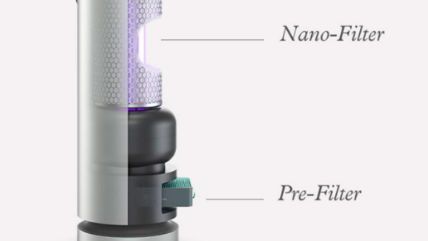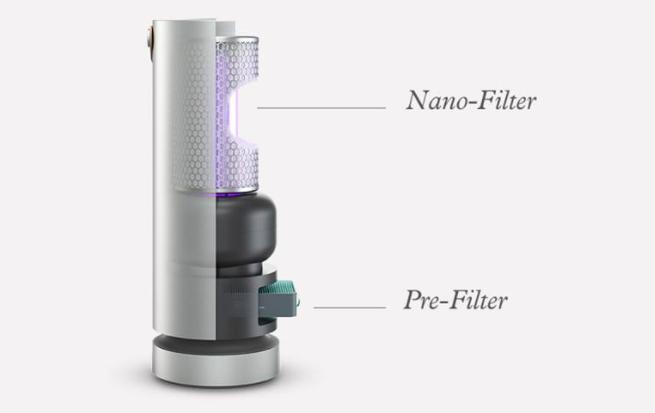6 Cool Innovations That Are Making the World a Better Place, Vol. 2
Reason's choice of SXSW's 2017 innovator awards

Reason readers already know that smart people + free markets = innovations that can change the world. But just in case you needed a reminder (or a proof of the pudding for your more skeptical friends), below are six products we found at South by Southwest Interactive (SXSWi), the big technology and entrepreneurship confab that happened in Austin, Texas, this month, that are working hard to make life a little better. Each was a finalist for one of the conference's Interactive Innovation Awards, and a couple of them took home first-place prizes, too.
6. Molekule: Fighting Indoor Airpollution at a Molecular Level
I am one of those poor souls who are allergic to anything and everything in the air. Dust. Dander. Smoke. Pollen. Carbon. Oxygen. I become a weezing, sniffling mess at the first sign of any of them. In desperation a few years ago I got myself an air purifier, but it didn't make much of a difference. Eventually the HEPA filter needed to be replaced, and I wasn't sure where to go to get a new one. Soon, rather than reducing the floating particle content in my apartment, it became just another object (ironically) collecting dust. And then I threw it in a dumpster. Enter Molekule, whose creators claim to have cracked the code on using nanotechnology, free radicals, and solar energy science (stick with me, I swear I'm not just blurting out buzzwords) in a process called Photo Electrochemical Oxidation (PECO) to actually break down indoor air pollutants at a molecular level. And the device—a finalist among Health, Med & Biotech products—knows when it needs a new filter and will automatically order one for home delivery, at a flat annual subscription rate. Although I can't testify that it works as promised, I very much hope I'll have a chance to find out in the near future.

5. Pavegen V3: Human-Powered, Er, Power
Pavegen has created a flooring system that absorbs the shock of pedestrians walking across it and, using tiny generators on the undersides of the triangular tiles, transforms that movement into electricity. In addition to being a true renewable source of energy, it would seem to hold a lot of promise for letting there be light (among other things) in remote locations without access to traditional power hookups. According to the Pavegen website, the "rotary motion" caused by a footfall "creates 2 to 4 joules of energy via electro-magnetic induction." The company's first permanent outdoor installation came to Washington, D.C.'s Dupont Circle neighborhood (also, coincidentally, home to Reason's D.C. office) last fall, showing that the system can stand up to relatively harsh winter conditions. V3 was the Innovation Award winner in the Smart Cities category.

4. The ODIN: Do-It-Yourself Gene Editing
Self-described "biohacker" Josiah Zayner wasn't content to get a Ph.D. in biophysics from the University of Chicago and do research for NASA. In 2016, he launched a crowdfunding effort to found The ODIN, which for $150 will sell you a DIY bacterial gene editing kit. That product, a nominee for the Health, Med & Biotech award, comes with all necessary components "to make precision genome edits in bacteria at home including Cas9, tracrRNA, crRNAm," plus a template so you can experiment on your own. "I believe that the only way that this works is if Science is democratized so everyone has access," Zayner wrote on Indiegogo. "Until now, no one has taken the time to develop protocols and methods and then be willing to provide all of this for a reasonable price that can be afforded without large institutional grants."

3. TunnelBear: Routing Around Internet Censorship
One of the ways oppressive governments manage to keep a stranglehold on their citizens is by controlling the flow of information via spying, censorship, and propaganda dispersal. Fortunately, Virtual Private Network (VPN) services can shield a user's online activities from her internet provider and, by creating a "tunnel" to a server in another country and connecting her to the internet from there, open up access to websites that would otherwise be blocked. TunnelBear is, of course, not the only such service. But it's making a bid to be the one that the masses turn to first to keep their communications safe. Unlike a lot of information security products, the website is slick and straightforward, the software is easy to install, and the interface is comprehensible. Because how much good can a service like this do if non-experts are too intimidated to give it a try? At $50 a year, TunnelBear—a finalist in the Privacy & Security category—is one of the most affordable VPN providers out there. Oh yeah, and they take Bitcoin.

2. The PRIME Needle-Free Injector: Because We All Hate Getting Shots
Portal Instruments set out to invent a better means of injecting medications—one that avoids the pain and anxiety many people experience from handling needles. The result is the PRIME injector, a handheld device that lets chronic disease sufferers self-administer a full dose of a drug in half a second (vs. the 10 to 20 seconds it takes now) and to do it without a needle or syringe. If that sounds like magic, well, you won't be surprised to hear the medical device startup (which is privately funded, Portal goes out of the way to point out on its website) took home the Innovation Award for Health, Med & Biotech. The technology works with a variety of biologics. Now all it needs is Food and Drug Adminstration approval.

1. Tokken: The Banking Solution for Cannabusiness
Due to labyrinthine federal regulations, marijuana growers, dispensaries, and other businesses—even in states where it's totally legal—can't get access to bank accounts and so must conduct all transactions in cash. Right? Not quite. A Denver-based startup called Tokken is here to change the game by offering companies and customers in the state a solution to this tricky problem. Founded by a former bank regulator, CEO Lamine Zarrad, the blockchain-based platform promises "to comply with every relevant regulatory requirement" on behalf of banks so they can rest easy knowing they won't get in trouble with the feds for extending their services to a cannabusiness. Consumers can then use the Tokken app to make purchases via a credit card stored in their own personal mobile wallet. Easy peasy. Tokken, which plans to expand beyond Colorado in the near future, was a finalist for the SXSW New Economy prize.

BONUS! What Reason TV found at SXSW: People using tech to take on tyrants. Check it out!


Show Comments (29)